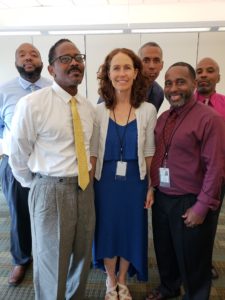Starting A Healthy Vegan Cooking Class for Those Who Were Previously-Homeless
Christopher Place Employment Academy in Baltimore, Maryland features many life skills classes, one of which is a Healthy Cooking class taught by Marcy Schveibinz. The topics explored in the class range from cooking basics to vegan lifestyles, including live cooking demonstrations every week. If you’re interested in starting a similar vegan cooking class in your area, here are a few tips and tricks to help you get started:
Marcy found this opportunity by contacting The Vegetarian Resource Group, which knew about the class. Reach out to local charities and organizations and see if they offer life-skills class. If they do, ask if they’re interested in adding a healthy cooking class to their program.
Look for recipes online. There are tons of resources about inexpensive, healthy vegan meals on www.vrg.org and other online sources. Using inexpensive recipes will help keep the cost of the class down, and will show that being vegan doesn’t have to cost a lot. Marcy cooked chili and stir-fry, pasta, and quinoa dishes in her class. These dishes were favorites among her students, and didn’t cost a lot to make.
See:
https://www.vrg.org/journal/vj2006issue2/2006_issue2_mealplans.php
https://www.vrg.org/nutrition/#nutrition-meal-plans
https://www.vrg.org/journal/CookingAndRecipes.htm
Cover a variety of topics in the class. Create a list of interesting subjects you can discuss with your students that will keep them learning something new every class. Marcy’s class covered basic nutrition, food labels and storage, cooking equipment and measurements, seasoning and spices, food related to diseases, meal planning, grocery shopping, and eating vegan on a budget.
Get your students involved. Even if you don’t have the resources to have every student cooking the meal, you should still be interacting with them while you demonstrate. Ask them questions about what they like to eat and thoroughly explain what you’re doing. Marcy teaches her class in a regular classroom with a portable burner. Even though her students aren’t cooking along with her, she asks the students about their favorite foods, how they could make them vegan, challenges that people might have going vegan, and ways to resolve those challenges.
Marcy found that the students in her class would often get distracted talking to other men about the lesson. To keep their attention, Marcy began including quizzes at the end of each class to make sure that the men were listening. Quizzes can include questions directly from the day’s topic and questions that allow students to connect what they learned on previous days to what they learned that day.
Learn from previous sessions of the class and adapt your class to what worked. Have the students fill out a questionnaire at the end of the session outlining what they liked and what they didn’t. Use this feedback to improve your class the next time, for example including more of the well-liked dishes and removing the dishes that the students disliked.
“I would hope that other cities have these types of programs for previously-homeless people to get back on their feet. I definitely think that a cooking class would be good for a similar program,” Marcy said.
If you have any questions about Marcy’s class, you can contact her via https://www.columbianutrition.com/

